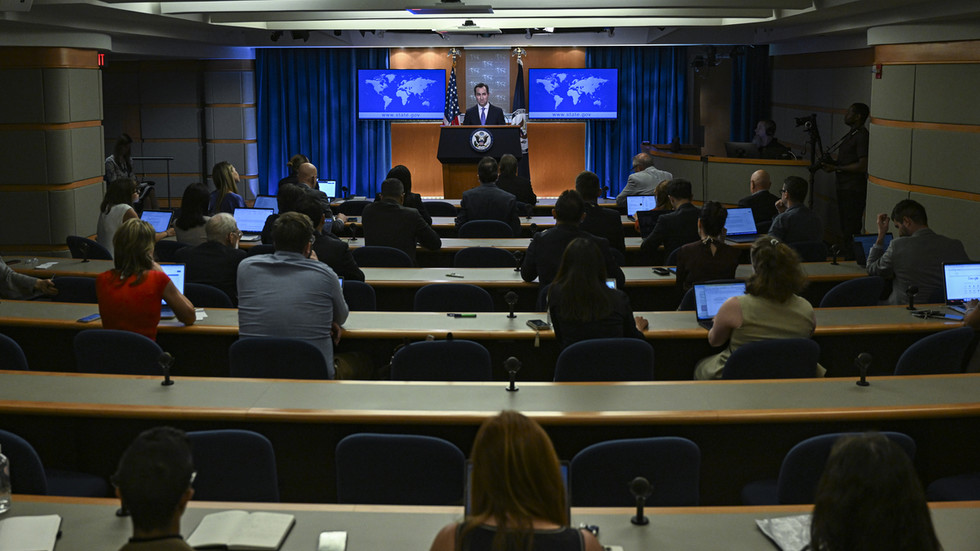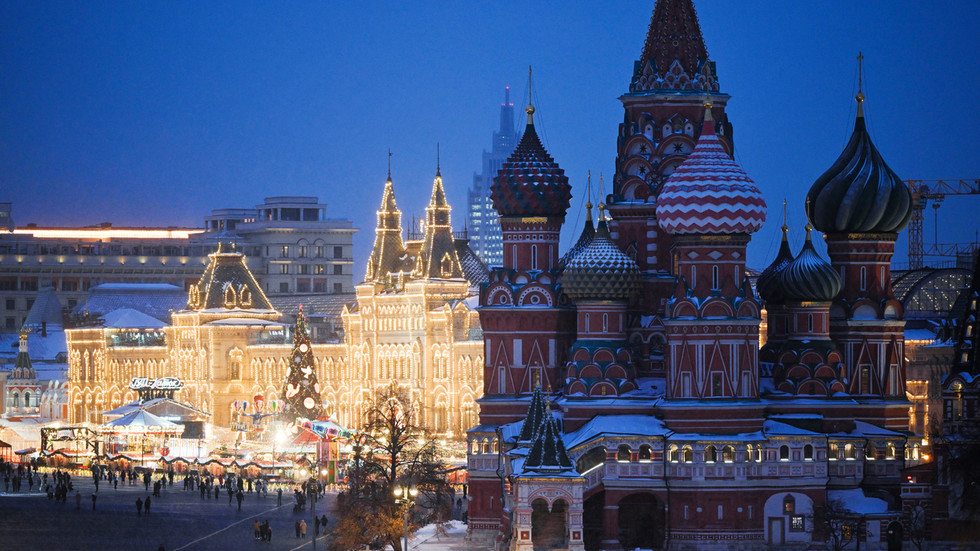
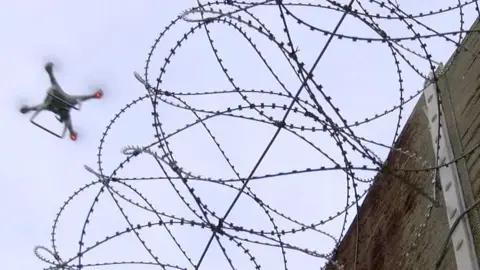 BBC
BBC
Latest government figures show the number of drone sightings has doubled since 2022
"More risky things" could come into prisons as more sophisticated drones mean bigger payloads of drugs are being smuggled into jails, HM Chief Inspector of Prisons has warned.
Charlie Taylor told the BBC: "We know security is being compromised in lots of prisons when it comes to drone activity. They can be in and out of a jail very quickly."
The number of drone incidents around prisons in England and Wales has risen nearly 10-fold since 2019, figures obtained by the BBC show.
The government says it has brought in restricted fly zones around prisons this year to try and disrupt illegal drone use.
Mr Taylor, said: "I think any contraband getting into prison is of a huge concern for us - whether it's drugs, mobile phones or something worse.
"We are seeing bigger payloads of drugs coming into prisons more mobile phones, drones are becoming more sophisticated in terms of how much they can carry, so of course it adds to the risk of potentially other more risky things coming into prisons."
Latest government figures show that 1,063 drone sightings were recorded around prisons last year - more than double the 478 sightings in 2022.
It marks a significant increase from the 122 cases reported in 2019, according to figures obtained by the BBC.

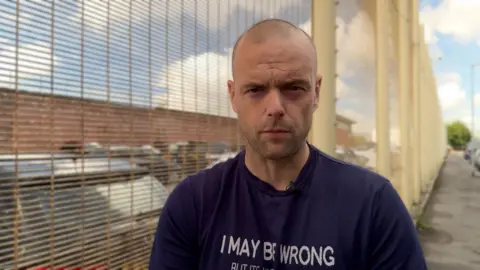 Ben Moore/BBC
Ben Moore/BBC
Former prisoner Jamie says drones are like a delivery service in some jails
Former prisoner Jamie, 37, who was convicted of two violent crimes, which he says stemmed from excessive drinking, spent 14 years in prison.
He said: “A drone can come into prison and it ain't getting stopped. And there could be anything on the drone. There could be a gun."
He said he was an eye witness to several drops during his time in prison.
"I’ll be stood at the window at night time and the lads will be talking out of the window, and all of a sudden a drone will come over. Someone will grab the parcel.
"That’s how easy it is to get parcels.”
Jamie says he has turned his life around since his release from jail several years ago and now runs a social media channel which he says helps prisoners get back on their feet after leaving jail.
Technology is being used to keep drones out of Guernsey Prison.
Drugs and mustard
Earlier this month, inspectors warned that HMP Garth high-security prison, near Leyland, Lancashire, had become "like an airport" with so many drones flying in drugs.
Inspectors reported that inmates were burning holes in cell windows to allow the drones in, and stealing mops and brooms to use their handles to collect the drugs.
Drones used to deliver drugs and other illicit items to prisoners have also become a "major problem" at HMP Swaleside in Kent, according to the prisons' inspectorate.
Meanwhile drone deliveries and items thrown into HMP Guys Marsh in Dorset are a constant challenge, the jail's Independent Monitoring Board (IMB) says.
Criminals in Greater Manchester are using skilled drone pilots to deliver everything from hard drugs to mustard directly to prison cell windows, police say.

 Ben Moore/BBC
Ben Moore/BBC
Steve Gillan, who was a prison officer for 34 years, says drones are a growing threat
The Prison Officers Association (POA) is also warning about the risk of drones dropping contraband into prisons.
Steve Gillan, the POA's general secretary, said: “Unless it's dealt with, I predict there could be a total disaster in one of our prisons if drones are flown in with incendiary devices, a gun or ammunition."
He said there had been a "dramatic increase" in the use of drones, with criminals using them to get drugs in to prison.
"They simply fly up to a cell window and just hand them in, or drop them into an exercise yard or to a field where prisoners will be tipped off to pick them up. But because staff can't be everywhere, inevitably these drugs get in."
Mr Gillan says prison officers bear the brunt of the drone deliveries.
"I’ve never known it as bad for the modern-day prison officer dealing with the barrage of drugs and violence that fuels our prisons."
He says the POA has been saying that things will get worse, not better, unless drones could be blocked from the perimeters of prisons.

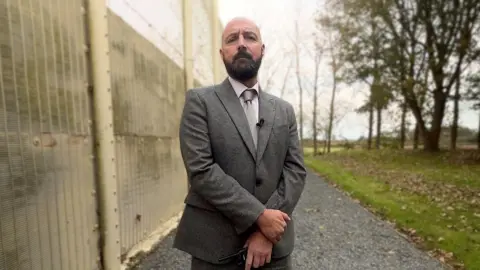 Ben Moore/BBC
Ben Moore/BBC
John De Carteret says Guernsey Prison uses a virtual fence to disrupt drone activity
In 2017 Guernsey Prison installed a virtual anti-drone fence, which overwhelms the signal between the drone and its controller.
However, the BBC understands the system trialled on the Channel island has not been introduced in jails in England and Wales.
Prison governor John De Carteret said: "When a drone tries to breach the perimeter, it's repelled until it runs out of battery and then it slowly lowers itself down to the floor."
He said no drones had been detected since the fence was put in place.
In England and Wales, since January it has been an offence to fly a drone within 400 metres (1,300ft) of any closed prison or young offenders institution.
At one prison in Manchester, the prison service is to install CCTV and netting to combat drones.
Those who break the rules could be fined up to £2,500, while people smuggling illicit items which drive violence and criminality in custody may face up to a decade behind bars.

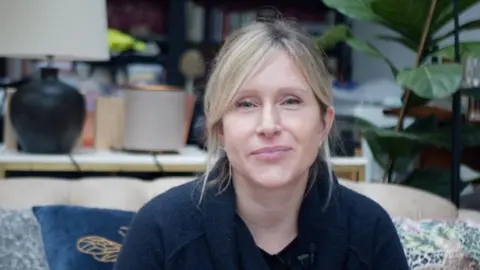 Ben Moore/BBC
Ben Moore/BBC
Dr Erin Sanders-McDonough says having more prison staff will not solve the problem of drug use in jails
Dr Erin Sanders-McDonough, a criminologist from the University of Kent, said: "The kind of mechanisms to get drugs through the door have been constantly evolving as the kinds of detection methods evolve. We haven't seen any reduction, despite these kind of these measures being introduced."
She said: "Just having more staff in prisons isn't going to solve this.
"We need a holistic approach that's going to tackle the kind of the root issues, which are mental health provision for drug treatment programs."
Mr Taylor told BBC Radio Sussex: "It's about physical security, having windows that are actually secure, ventilate the cell but are also secure.
"It's'about having netting in place that helps to stop drones being able to land.
"It also requires technological solutions as well, so things like ways of potentially detecting drones, having CCTV cameras that pick up where drones are dropping stuff off."
A Prison Service spokesperson said: "Police and prison staff have worked collaboratively to make over 90 drone-related convictions – resulting in sentences totalling more than 315 years behind bars law.
“We have a zero-tolerance approach to drugs, and these figures show our work locally with the police to deter, detect and disrupt the growing illegal use of drones around prisons.
“In January, we also introduced restricted fly zones for drones around prisons."

 4 weeks ago
9
4 weeks ago
9




